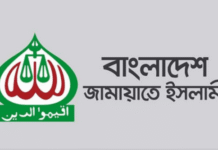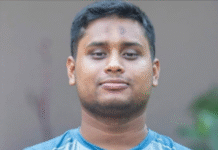Sadeq Khan
Due process of transition of power in Bangladesh is in a quandary. With Ershad’s withdrawal from general election scheduled to be held under the ruling alliance’s blue print of a poll-time government of Treasury Bench members, resistance to the election schedule and to the poll-time government has now become formidable.
Over three-fourths of the registered political parties are now boycotting the scheduled general election. Excepting the Awami League, those of the Treasury Bench participating in the one-sided polls either with the Awami League election symbol or with their own choice of a symbol are in reality political individuals with small bands of following and no mass support. What the ruling party and its political cronies are now insisting on staging, in the name of general election, is but a walk-over of one-party system nominees in the guise of a multi-party arrangement under a unilaterally doctored constitutional amendment enacted without opposition participation in the parliament and without a referendum.
Over three-fourths of the registered political parties are now boycotting the scheduled general election. Excepting the Awami League, those of the Treasury Bench participating in the one-sided polls either with the Awami League election symbol or with their own choice of a symbol are in reality political individuals with small bands of following and no mass support. What the ruling party and its political cronies are now insisting on staging, in the name of general election, is but a walk-over of one-party system nominees in the guise of a multi-party arrangement under a unilaterally doctored constitutional amendment enacted without opposition participation in the parliament and without a referendum.
Civic life, economy halted
The Question now is: For all the bravado of the Prime Minister to go ahead with the general election as scheduled, can the Election Commission and her poll time administration do so in the face of violent countrywide resistance? Brutal measures of repression and the steamroller of state terror, random arrests and detention under gang-cases have not been able to stem the tide of countrywide protests, hartals and blockades that have practically brought the buzz of civic life as well as the wheel at the national economy to a standstill. Since October 27, with the advent of the time of conversion of the parliamentary government into pre-poll caretaker government ninety days before the expiry of the ninth parliament’s tenure as per the said amendment, unrest that has been brewing in the country against the government’s misrule and wilful victimisation of political opponents, its corruption and rent-seeking in all spheres of life, and its suspect scheme of poll-time abuse of state-power retained for all of its ministers and parliamentarians under the said constitutional amendment, had simmered into an explosive state of country-wide dimensions.
Hartals and blockades had been continual in practice, except for an interregnum of ten days in capital Dhaka only in November, over more than five weeks now. During that time, over 300 protesters, passengers or onlookers have died, in police firing and under cocktail bursts or arson burns. Over 7000 persons have been wounded with bullet injuries, burns or in clashes with lethal weapons. Up to the third week of October since the beginning of the year another some 250 deaths occurred in police firing or in violent clashes throughout the country. Nearly 5000 persons were wounded as per newspaper reports, discounting the claims of deaths in the dark killing of Hefazat sit-in activists after midnight of May 5 this year in Dhaka Shapla Square. The intensity of the resistance with the accompaniment of destructive and subversive side-effects, whether engineered by rogue elements or, as opposition leaders allege, by agent-provocateurs surreptitiously introduced by intelligence units of the government, are continuing to grow. The public tends to blame the government continuing to grow the opposition for the unmistakable signs of breakdown of law and order throughout the country.
UNHCR for inclusive polls
On December 1, 2013, the UN High Commissioner for Human Rights Navi Pillay issued a statement saying she was deeply worried by the rising levels of political violence in Bangladesh as the major parties fail to resolve their differences over the conduct of elections. The statement said: “In recent weeks, supporters of both parties have been clashing with each other and with the security forces. Scores of people have been killed, hundreds injured, and there has been extensive destruction of property.
“Such levels of violence are deeply shocking for the Bangladeshi people, the vast majority of whom want and deserve a peaceful and inclusive election. “The on-going arrest and detention of key opposition leaders by the law enforcement agencies can further inflame the situation and rule out any possibility for engagement and dialogue between the main political parties. “Whatever their differences, political leaders on both sides must halt their destructive brinkmanship, which is pushing Bangladesh dangerously close to a major crisis. Instead, they must fulfil their responsibility and use their influence to bring this violence to an immediate halt and seek a solution to this crisis through dialogue.” The High Commissioner pointed out that Bangladesh is a State Party to the Rome Statute of the International Criminal Court, and warned: “In other situations, we have seen cases of political or election related violence where the perpetrators of such acts – including political leadership – have faced prosecution.”
Crime against humanity
Rupert Coleville, the spokesman of the UN High Commissioner for Human Rights, in press interview with the Bengali daily Prothom Alo on December 4, clarified the matter of patent culpability of government leaders and other politicians of Bangladesh, irrespective of their official status or immunity, under Section 27 of the Rome Statute for crimes against humanity in law-enforcement or in law-breaking.
The US embassy in Dhaka in a statement on December 3 said, “We believe that it is now more urgent than ever for both the major parties to empower trusted lieutenants to undertake constructive dialogue to find a way forward to hold free and fair elections that are credible in the eyes of the Bangladeshi people.
“We believe that with goodwill, the two parties can still find a way to provide the free, fair and credible elections that the Bangladeshi people want and deserve.” In another statement in Dhaka the same day, Canadian High Commissioner Heather Cruden said: “It is still possible for all parties and political organisations to find a negotiated solution, if there is political will, to ensure that the upcoming general election is transparent, inclusive and peaceful.” The European Union High Representative Catherine Ashton in a statement issued from Brussels called on the leaders of all political parties to agree on a mutually acceptable formula to hold a peaceful, inclusive, transparent and credible election.
Clearly, all these warnings from abroad are weighing heavily against the obstinate intent of the ruling coterie to carry on with its scheme of one-sided election. Much much heavier is the weight of violent resistance that has now built up within the country itself, isolating the Awami League and its cronies.
State of emergency?
According to press reports, Prime Minister Sheikh Hasina, before meeting her party leaders to reiterate her intentions to go ahead with general election as scheduled, had a meeting with the three chiefs of the Armed Services and told them to remain on the alert. That news has led to speculations that she is mulling the option of declaring a state of emergency if gravely deterred in her pursuance of the election schedule as it is. The New York Times, in a news analysis on Bangladesh by Jim Yardley from Dhaka published on December 4 on-line, comes to the same conclusion in a different way:
“If a compromise is not reached on the elections and Mrs. Zia refuses to participate, the Awami League is certain to sweep to victory. Far less certain is whether the public will regard the results as legitimate. Much will depend on turnout; if more than half the electorate participates, Mrs. Hasina will have more solid footing to claim public support. But turnout could be far lower, which many analysts say could usher in a period of political instability, as opponents would most likely take to the streets to demand a new round of voting. That raises the possibility that the Bangladeshi military, in the name of national stability, might declare a state of emergency.”
Source: Weekly Holiday










